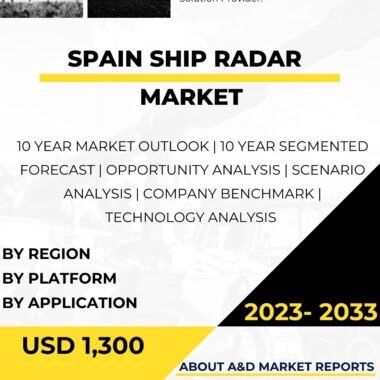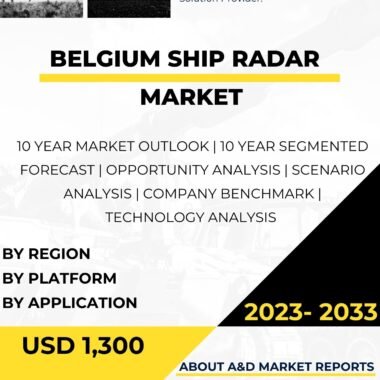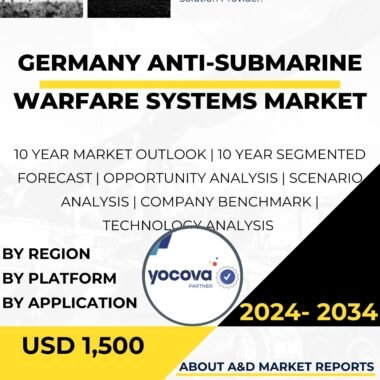Description
Netherlands Anti-Submarine Warfare Systems Market
Netherlands anti-submarine warfare systems market has been a critical and evolving segment within the country’s defense industry. Anti-submarine warfare systems are designed to detect, track, and neutralize enemy submarines, which are potent threats to naval operations and maritime security. Given the Netherlands’ extensive coastline, maritime interests, and involvement in international security efforts, the country recognizes the strategic importance of ASW capabilities in protecting its territorial waters and contributing to broader maritime security initiatives.
The Netherlands ASW systems market encompasses a range of technologies and platforms, including sonar systems, anti-submarine torpedoes, maritime patrol aircraft, and naval vessels equipped with ASW capabilities. These systems are designed to work in synergy, providing comprehensive coverage and effective detection and response to potential submarine threats.
One of the key drivers of the Netherlands ASW systems market is the country’s commitment to maintaining a modern and capable navy. The Royal Netherlands Navy heavily relies on advanced ASW systems to safeguard its naval assets and protect maritime trade routes. ASW capabilities are vital for countering submarine threats from potential adversaries, providing deterrence, and supporting maritime security operations.
The market is also influenced by the Netherlands’ participation in international naval exercises and security collaborations. As a member of NATO and a proactive participant in international security efforts, the Netherlands actively engages in joint naval exercises with allied navies to enhance interoperability and share best practices in ASW operations. These collaborations contribute to the Netherlands’ maritime security and reinforce its role as a responsible maritime player.
The Netherlands ASW systems market is characterized by efforts to enhance the performance and capabilities of ASW technologies. Research and development initiatives focus on increasing the range, sensitivity, and processing capabilities of sonar systems, improving the accuracy and lethality of anti-submarine torpedoes, and advancing the surveillance and data fusion capabilities of maritime patrol aircraft.
Integration and interoperability are critical considerations in the procurement and development of ASW systems. The seamless integration of ASW technologies with naval vessels, maritime patrol aircraft, and communication networks ensures effective targeting and coordinated operations. Furthermore, interoperability with allied navies enhances information sharing and cooperation in multinational ASW operations.
In the context of the Netherlands’ maritime security strategy, ASW systems play a crucial role in maintaining situational awareness and maritime domain awareness. The deployment of modern ASW technologies enables the Netherlands to effectively detect, track, and respond to potential submarine threats, providing a layered defense to protect its territorial waters and maritime interests.
Maritime patrol aircraft equipped with ASW capabilities play a critical role in conducting reconnaissance and surveillance over vast maritime areas. These aircraft are equipped with advanced sensors and sonar systems that enable them to detect and track submarines even at extended distances. They are also essential for coordinating ASW efforts and providing real-time intelligence to naval forces.
Naval vessels equipped with ASW capabilities, including frigates and corvettes, form an integral part of the Netherlands’ ASW strategy. These vessels are equipped with sophisticated sonar systems, anti-submarine torpedoes, and other ASW technologies to detect and neutralize potential submarine threats. The ability to conduct ASW operations from surface vessels enhances the Netherlands’ flexibility and responsiveness in countering submarine threats.
The market also addresses concerns related to training and skill development. Effective ASW operations require well-trained personnel with expertise in using ASW technologies and tactics. The Netherlands invests in training its naval personnel and equipping them with the knowledge and skills necessary for successful ASW missions.
The export potential of the Netherlands’ expertise in ASW systems is another significant aspect of the market. The country’s reputation for technological innovation and responsible defense practices makes it an attractive partner for other nations seeking to enhance their ASW capabilities. Exporting ASW technologies and related expertise provides economic benefits for the Netherlands’ defense industry and fosters international collaborations.
In conclusion, the Netherlands ASW systems market is a critical and evolving segment within the country’s defense industry. Advanced ASW technologies play a crucial role in enhancing the maritime defense capabilities of the Netherlands, protecting its territorial waters, and contributing to international security efforts. The market is driven by the country’s commitment to maintaining a modern and capable navy, as well as its active participation in international naval exercises and security collaborations. As the Netherlands continues to invest in research, development, and export opportunities, the ASW systems market is expected to play an increasingly pivotal role in shaping the country’s maritime security and supporting its naval forces in meeting the challenges of the evolving maritime security landscape.




